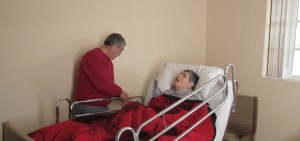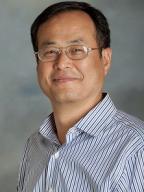CSUN Spanish-Language Video Explores End-of-Life Care Options

A scene from video.
It’s a simple video featuring interviews with doctors, nurses and the family members of a dying patient in the late stages of Alzheimer’s disease who turned to hospice care so she could spend her last days at home among loved ones.
What makes the video — a passion project of Kyusuk “Stephan” Chung, an associate professor of health administration at California State University, Northridge’s Department of Health Sciences — stand out is that it is entirely in Spanish, designed to educate a population, in particular the Latino community, that may not know that end-of-life care options extend beyond putting a dying loved one in the hospital or family members struggling on their own to care for that person at home.
“I have spent more than 10 years researching end-of-life care, and in particular hospice care,” said Chung, the former director of the Institute for Aging at Governors State University in Illinois. “While the population as a whole is becoming more and more aware that hospice is an option, there is still a huge gap, a lack of awareness, in Hispanic and Asian communities.

Kyusuk “Stephan” Chung, associate professor of health administration at CSUN.
“Part of it is cultural,” he said. “In those communities, there’s an assumption that family members will take care of a loved one when they are ill and dying, regardless of the situation in the family. Hospitalization is not an option. Part of it is lack of education. People in those communities are not aware that they can still fulfill their familial obligations, but don’t have to do it alone. There is help out there, such as hospice care, that can assist them in caring for a loved one at home, and ensures that they have the right equipment and support, including medical support, so that the family and the patient are cared for in the best way possible.”
Part of the care, Chung noted, includes helping family members manage the practical details and emotional challenges of caring for a dying loved one.
He has plans to create similar videos in Korean and Chinese.
“When you are dealing with an end-of-life situation, it can get overwhelming,” Chung said. “It’s important that families truly know what their options are.”
Lisa Guillen, a longtime hospice care nurse who took part in the video, agreed.
“I have been in hospice for 15 years, and over that time I’ve seen very little besides brochures and pamphlets that truly reaches out to patients and their families and lets them know what hospice is,” she said. “This is the first video I have ever seen that reaches out to the Latino community and speaks to them in their language. I am very impressed with it. The video is simple and honest, and that is what makes it so powerful.”
Joanna Jacobo, 23, who graduated from CSUN this May with a degree in journalism, was one of the six Northridge students or alumni who worked on the video. The others included cinema and television arts senior Eugene Luzong, journalism alumnus Manual Morfin, health administration alumnus Gabriel Bolivar, and film alumae Edmund Kawn and Erick Evan Aguilar, all of whom graduated in 2013.
Jacobo admitted that she wasn’t sure what she signed on to when she and her classmate agreed to work with Chung on the project.
“I thought it was cool that we were going to be working on a documentary and that we were going to do it in Spanish,” she said. “But once the project was complete, I realized it was something kind of special.
“I am Latina and in our culture, you feel that you can’t leave family members’ end-of-life care to complete strangers,” Jacobo said. “I had never really heard of hospice care before working on this. Like a lot of people out there, my family has been taking care of an ailing loved one — in our case, my great-grandparents. I learned so much. People need to know what their options are, and I an honored to have worked on something that can help educate them.”
Chung said he was inspired to make the short documentary in part because his own parents died in a hospital of cancer.
“In the late stages of their lives, when it was clear that they was not going to survive, just days before they died, the hospital still carried out invasive ‘preventative’ procedures that really had no use, but were done anyway to fulfill the hospital’s obligations,” Chung said. “At that time, I felt I had no choice but to put them the hospital. Hospice care was not an option.
“It is now, and people need to know that they have a choice.”

 experience
experience